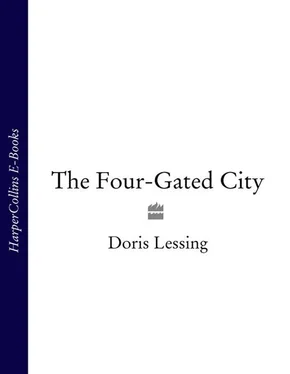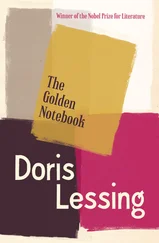Mark was the one among the four brothers to have had an unconventional education. Their father, Henry, had been a conservative member of Parliament: he was conservative by tradition, it was in the blood, as Mark emphasized, to make Martha understand that there were two kinds of Tory, those like his father constitutionally incapable of understanding that the country could be run by anybody else; and the Tories by intellectual conviction, whom Mark found intolerable. But he had loved and admired his father. The four sons had been brought up here, in this house, and in a house in the country, sold at the father’s death because of duties. This house belonged to the sons. Margaret Coldridge had then married for love (Mark claimed she had not loved his father, but had been married off to him), Oscar Enroyde, a financier; and for the four years the marriage lasted Margaret had inhabited the world of international money, which it seemed had been an unpleasant surprise to her. Not because she disapproved of it, but because she was indefatigably English, and was hardly ever able to be in England. The sons, being educated, were for the most part in England, while their mother was mostly in America. She described her second marriage’s break-up as: ‘I couldn’t stand dear Oscar’s friends.’ Mark said his mother was fundamentally a hostess, and one of a certain kind: she needed to attract, then domineer, guests. Married to Oscar Enroyde, she had found her guest-list already established, and she spent most of her energies heading people off one of the world’s very rich men. And besides, she was a woman of multifarious talents, none of them now useful. If a chair, for instance, was broken, she knew just that one little man, in Kent, who understood that kind of chair, and she liked to take it herself, and exchange talk with minute professionalism about the chair’s history, condition and needs. She hated being waited on.
During the war James was killed. There was a daughter, Elizabeth, now absorbed into the wife’s second marriage. This girl, about fourteen now, sometimes came to stay.
After the war Margaret married again – improbably to everyone but Mark. Her third husband was an amiable country gentleman, an amateur of the arts, vaguely a publisher, who served on a sort of semi-official body to do with the arts. He adored Margaret. Oscar Enroyde had not adored Margaret, she had adored him. Now Margaret entertained a good deal. Mark said his mother had an infallible instinct, unrecognized even by herself, for what was the next thing, what was in the air, and this marriage proved that the arts would soon be fashionable: unlikely as this seemed in grey, colourless, restricted post-war Britain.
Mark neither liked nor disliked this husband, John Patten, but he violently disliked him in his role of patron of the arts. This was a tension between son and a mother who wished that Mark, now that he was a ‘writer’, not only potential but published, would attend her weekend parties or at least an occasional dinner-table. If Mark had to go down for Christmas, he would hate it. But he would go, because of his concern for the child, for Francis’s Christmas. Yes, but that was not Martha’s affair. Unless the mere fact that she was here, had arrived here by what seemed such a slight chance, made it her affair? Had she ever, by any hint, or lapse of behaviour made it seem likely (to Mark, to Margaret) that she felt it was her affair? Yesterday Margaret had telephoned, apparently about some set of spare curtains, but really to find out if Martha intended to be there for Christmas. It appeared from her tone, gaily casual, that she both wished that Martha would not be there, so that Mark would be available for a Boxing Day Party, and wished that Martha would be there looking after Francis, because there would be no other children at the Pattens, and she, Margaret, was afraid the little boy would be lonely among so many adults. Margaret had not mentioned Lynda, so much in both her and Martha’s thoughts. She had, however, said she hoped that supplies would be laid in for Christmas because if she, Martha, did not attend to it, who would?
Martha now decided that she should get up. Downstairs was quiet. Sally-Sarah would have gone out shopping. Margaret was right, she, Martha, should arrange for food and supplies before she left: not to do so was positively neurotic. Today however, she would be careful not to notice the absence of butter and eggs.
For the first week of her being here Mark had been stubbornly resistant to her doing any housekeeping at all. But when she had understood the situation, and said that she did, they had established a defensive pact against the whole family. Who wished that Mark would divorce his wife Lynda and marry again. Not, of course, Martha, equally unsuitable. But Martha in the house, housekeeping, being kind to the little boy, was a kind of bridge from Mark’s previous condition of total womanlessness to the possibility of a new marriage. Because before this he had always refused to have any sort of woman around at all, even a secretary. For he was married to Lynda. The house was ready for her return. She was only temporarily away, temporarily in the hands of the doctors. She would – perhaps not soon, return to a house kept empty and waiting for her and to a child waiting for his mother.
This had been going on for three, four years.
Francis had been sent to a boarding-school, though Mark did not approve of boarding-schools; and spent an orphan’s life with his grandmother, who found the little boy a burden; with Sally-Sarah and Paul (Colin was always working, he was seldom at home); with the other brother’s family. Arthur’s – Arthur was Phoebe’s ex-husband, now re-married. And sometimes he stayed with Phoebe. Sometimes he was alone with Mark in this house.
There were photographs of Lynda in his room and in Mark’s room. Lynda’s clothes hung in Mark’s cupboards. It was all wrong – the family were right. It had that stamp of excessiveness, of unreality which – indicated a passion. Indicated, in short, the growing-point, that focus in a person’s life which so few people are ever equipped to see, and which is why lives remain, even to the nearest and dearest, so often dark, obscure; lit only by these flashes of what seems an unhealthy-gleaming light: a passion. But if Martha were the family she would do the same, feel the same, and try every way fair or foul, to make Mark see that he could not spend the rest of his life as if he were married to Lynda. Who, it was clear, was unmarriageable. The family were right about that. Lynda had never been a wife, never been a mother. She could not be, Mark ought never to have made her either – so said the family. And here it was that a close secret nerve ached and nagged in Martha: she had not met Lynda, save through improbably beautiful photographs, but she knew her, oh yes, very well, though she and Martha were not alike, and could not be, since Martha was not ‘ill’ and in the hands of the doctors. But for a large variety of reasons, Lynda Coldridge, who was in a very expensive mental hospital because she could not stand being Mark’s wife, and Francis’s mother, came too close to Martha. Which was why Martha had to leave this house, and soon.
She went down to the kitchen. A note on the table said in green pencil; ‘Martha! No eggs! No butter! The left tap is leaking! I shall bring back food when I come. Love. Sarah.’ She submitted – for what alternative did she have? – to being Sally in this family, but she always signed herself, Sarah.
There was a letter on the table. A child’s hand. It was from that nasty school – a cold, heartless military camp of a school.
Dear Martha, How are you? I am very well. I need football boots. I don’t like football. But I do like cricket. I hope you will be there for Christmas. With sincere greetings. Francis. P.S. Please tell Daddy about the boots. Last time he got the wrong size. I want a chemistry set for Christmas. A real one, not a baby’s one, please tell Granny I want a real one. With sincere greetings, Francis. See you at Christmas, what a hope, ha ha!
Читать дальше












